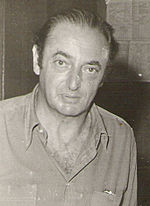Humberto Costantini, Date of Birth, Place of Birth, Date of Death
TweetHumberto Costantini
Argentine writerAbout Humberto Costantini
- Humberto "Cacho" Costantini (April 8, 1924 – June 7, 1987) was an Argentine writer and poet whose work is filled with the rich slang (porteño) of Buenos Aires.
- Except for his years of exile in Mexico, his life was lived in and around Buenos Aires. Costantini was born and died in Buenos Aires, the only child of Italian Jewish immigrants who lived in the barrio of Villa Pueyrredon.
- From his marriage to Nela Nur Fernandez, he had three children: Violeta, Ana and Daniel.
- After he finished his university studies, he became a medical veterinarian.
- He practiced his profession in the fields near the city of Lobería, in the province of Buenos Aires, where he moved with his wife.
- There his two daughters were born. In 1955 he returned to Buenos Aires, and his son was born shortly thereafter.
- He worked in various jobs: veterinarian, salesman, potter, medical researcher, etc.
- Because of a fierce discipline, working "nailed to the chair", he was able to write and rewrite everyday. His first book of stories, De por aquí nomás, was published in 1958, and from that time on there developed a long bibliography which touched all literary genres: short story, poetry, theatre, novel.
- His unfinished work, Rapsodía de Raquel Liberman, relates in biblical tones the exploits of a Jewish prostitute enslaved by the sinister organization Zwi Migdal, until she rebels against this fate and leaves that life behind her.
- And here a fundamental theme appears, as in many other of Costantini's works, a force that drives his life and work: "To do what is right in the eyes of Jehova, meaning to fulfill one's destiny," as he would say.
- That attitude–of doing what is right–led him in many moments of his life to confront the powerful, as his heroine, Raquel Liberman succeeded in doing. Costantini was the victim of political persecutions and blacklists.
- That posture of confronting the powerful that "Cacho" exercised naturally, without fuss, as the only possible road by which to travel through life, created both hatred and profound loyalty among many toward him.
- With Costantini nothing was ever wishy-washy; one was either honest or one was deceitful.
- He made it known that he wouldn't forgive any kowtowing. From his youth he was politically active: in his student days he confronted the Fascists of the Alianza Libertadora Nacionalista and was politically active in the Communist Party until serious divergencies of opinion with the bureaucratic and pro-Soviet leadership caused him to break away.
- His "doing what is right in the eyes..." moved him to admire profoundly Ernesto Che Guevara.
- In the 1970s he was politically active on the revolutionary left, together with other writers, such as Harold Conti and Roberto Santoro, who were imprisoned by the criminal dictatorship of Videla, and to this day are still disappeared.
- His novel De Dioses, hombrecitos y policías was written between scary moments and escapes, in clandestine houses at unthinkable hours.
- This novel was awarded the Casa de Las Américas Prize by an international jury and published in Mexico (later it was translated as The Gods, The Little Guys and the Police, translated by Toby Talbot and published in New York to excellent reviews).
- About this novel and other work of Costantini, Julio Cortázar said, "I love what Humberto Costantini does, and am full of confidence in his work.
- He is, for me, a very important writer." In 1976 Humberto Costantini was forced into exile and went to Mexico.
- There he continued his writing that was to win important prizes.
- He suffered in an exile that obliged him "to glance through the lists for his loved ones, as if the city had been hit with a typhoon".
- He conducted narrative workshops regularly, made programs for radio and for television and he fell in love.
- As he said on his return: "In short, I lived".
- Another of his passions was the tango.
- An admirer of Osvaldo Pugliese, Anibal Troilo ("Pichuco") and Eduardo Arolas, he was a singer and dancer, knowledgeable in the lyrics and the history of the tango.
- In get-togethers with friends, there was always some guitar to accompany his voice, resonant with passion, as he would sing the milonga Marieta or El adios de Gabino Ezeiza.
- He composed milongas and tango lyrics, some of which were published and recorded. In 1983, after seven years, seven months and seven days of exile, he returned to Buenos Aires.
- There he lived the democratic springtime.
- He walked through the city, conversed with the streets of his barrio and with old friends of his infancy, knocked around, flabbergasted through his Buenos Aires.
- His work is published in many languages in addition to English, among them: Czech, English, Finnish, German, Hebrew, Polish, Russian and Swedish.
- His second novel, appeared in English as The Long Night of Francisco Sanctis, translated by Norman Thomas di Giovanni. He died on the morning of 7 June 1987 from an illness that he had contracted much earlier.
- The night before, taking advantage of the slight well-being between chemotherapy treatments, he worked—as he had each day—on his novel La Rhapsodía de Raquel Liberman of which he managed to complete two volumes.
- This work remains unpublished.
Read more at Wikipedia
See Also
- Famous People's Birthdays on 08 April, Argentina
- Famous People's Birthdays in April, Argentina
- Famous writer's Birthdays on 08 April, Argentina
- Famous writer's Birthdays in April, Argentina
- Famous poet's Birthdays on 08 April, Argentina
- Famous poet's Birthdays in April, Argentina
- Famous author's Birthdays on 08 April, Argentina
- Famous author's Birthdays in April, Argentina


 Date of Birth:
Date of Birth:  Place of Birth: Buenos Aires, Argentina
Place of Birth: Buenos Aires, Argentina